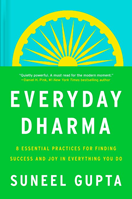An Excerpt from Everyday Dharma
September 14, 2023
Suneel Gupta offers readers a chance to rediscover their essence, follow their wildest ambitions, and finally know what it means to experience lasting success and joy.
 What happens when, no matter how hard you strive, you still feel empty inside?
What happens when, no matter how hard you strive, you still feel empty inside?
Your “inner calling,” or Dharma, holds the answer. For centuries, the way of Dharma has transformed lives and offered a structure to blend ambition, work, and contentment. With Everyday Dharma, author Suneel Gupta makes this timeless wisdom easily accessible to anyone.
The excerpt below, from the book's introduction, challenges the conventional belief passed down from generation to generation that success singlehandedly brings us joy.
◊◊◊◊◊
Where We Begin
Nearly everywhere I looked, people seemed lost and angry. Lost because if there is no point of arrival, then where the hell are we on the map? Angry because we paid the money, went to college, took out loans, got jobs, showed up every day, and did all the things we were supposed to do—only to find that we were no closer to the sense of joy that we had been chasing all these years.
So a lot of us checked out. We disengaged. We quit quietly or left our jobs. When this happened en masse, they called it the “Great Resignation.”
For too long, we have fixated on the future of work and ignored the future of worth. For too long, we’ve dismissed “joy” as being too flimsy to fit into a place of business. And for too long, we’ve assumed that outer success will lead to inner success, despite history proving again and again that this has never been the case.
In fact, more than a thousand years before the Great Resignation, there was another exodus from the workforce: a movement my ancestors called the Great Renunciation.
Imagine ancient India, a golden era. Cities and commerce and marketplaces were all emerging. Brightly colored carriages packed the streets. Elephants elegantly transported merchandise to and from distant lands.
You could hear, smell, and feel progress everywhere. Huts turned into homes, tattered sheets gave way to finely stitched clothing, and dirt floors converted to marble. Companies began to form. Entrepreneurs hustled their way out of poverty. Employees embraced workweeks.
It was exciting, and yet it didn’t take folks long to feel the grind. Promotions led to more responsibility; hard work led to more hard work. Parents struggled to spend time with their children. Neighbors began to feel like strangers. Communities became overrun by a tone of competitiveness. Emotional exhaustion began to fill the air.
This opened up what some refer to as a “spiritual vacuum” in South Asia. People were achieving more than ever before, and yet feeling no greater sense of fulfillment in their everyday lives.
Spirited debates broke out across the subcontinent. One side pointed to the buildings and the markets and said, “Look how far we’ve come!” The other side responded with, “Yes, but are we any happier as a result?”
The divide deepened over time. One camp came to represent outer success and the other came to represent inner success. One side championed the creation of wealth, status, and progress; the other began a quest for meaning, purpose, and joy. They renounced their material possessions and quit their jobs. Many fled to the forests in search of stillness. Their goal was to return to the simpler times of their ancestors. Deep in nature—and far from the grind—they were free to meditate, pray, and rejoice in a feeling of liberation.
After a while, though, all that free time felt like too much free time. People began to miss the outside world. Not necessarily the pressure and the pace—but the act of creating, building, and getting things done. They missed serving their customers and their community. They missed waking up with a sense of purpose and going to bed with a sense of accomplishment.
The forest dwellers knew the working world led to burnout— but escaping it led to boredom. It was anxiety versus apathy. Neither felt like a good way to live.
So they went searching for a middle path, one that didn’t force them to choose between outer ambition and inner peace. They wanted both: to dream big and to feel fulfilled.
What emerged changed everything. People began to reach new heights on the outside, while experiencing a more lasting sense of joy on the inside. To them, outer success and inner success no longer felt like spiritual opposites—they were connected at the core.
The Bhagavad Gita says that each of us has a dharma, or a “sacred duty.” Duty to whom, exactly? To the fire burning inside of you. Some call this purpose, others call it your gift. My grandfather called it your essence.
Your essence doesn’t care about power, promotions, or possessions. It only cares about one thing: expression.
When you’re expressing your essence, you’re in your dharma. You come alive in a brand-new way. You feel confident, creative, and caring. You are no longer asking for permission to do what you love. You are serving others with energy and kindness.
Excerpted from Everyday Dharma by Suneel Gupta and reprinted with permission from HarperOne, an imprint of HarperCollins Publishers. Copyright 2023.


